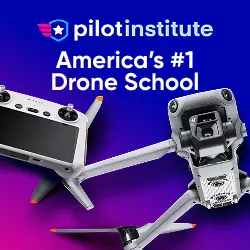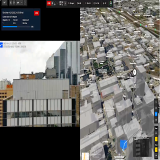
07 November 2025
It’s not the end of the world. There are still forces at work that can make a real difference — and there’s still time to act.
But if we fail to pay attention, the consequences could be severe — not just for the drone industry, but for businesses, first responders, and public safety across the country.
A Quick Backstory
In case you’ve been living under a rock for the past two years, the Fiscal Year 2025 National Defense Authorization Act (NDAA) was signed into law on December 23, 2024. That date matters, because tucked inside the bill is Section 1709, titled “Analysis of Certain Unmanned Aircraft Systems Entities.”
Section 1709 requires a security audit of companies like DJI and Autel, along with any communication or video surveillance devices or services produced under license or agreement with them. Essentially, it’s designed to evaluate whether drones and related equipment from these companies pose a security risk.
Here’s the critical detail: Section 1709 mandates that this audit must be completed no later than one year after enactment — meaning by December 23, 2025.
If that deadline is missed, or if Congress does not extend it, all products from DJI, Autel, and their partners could automatically be added to the Federal Communications Commission (FCC) “covered entity” list. This includes drones, cameras, gimbals, and even software or communication devices associated with these companies.
Why That’s a Big Deal
Being on the FCC covered entity list is not just a bureaucratic inconvenience, it has real-world serious consequences. Any company on the list cannot receive an FCC license, which is legally required to operate in the United States. Without that license, their devices would lose permission to use the frequencies controlled by the FCC.
Operating a non-licensed device would violate federal regulations and could result in substantial fines or even criminal penalties. Fines can range from $500 per day per violation to $10,000 for unlicensed operations.
While it’s unclear if the FCC would aggressively pursue every individual pilot, businesses with legal departments will almost certainly shut down operations to avoid exposure. Even more concerning is insurance: most policies exclude coverage for unlicensed operations, meaning operators could be financially liable for damages or accidents.
So, before you launch a non-FCC-approved drone, you need to think very carefully about the legal and financial risks.
The FCC’s Expanding Power
In addition to listing entities, the FCC recently voted unanimously to allow the agency to revoke previously approved licenses for any company on the covered entity list. While some legal experts question whether the FCC can legally grant itself this expanded power, in today’s Washington, it’s difficult to predict how far the agency might go. This expansion means that even drones already operating legally could suddenly be rendered illegal.
With the December 23, 2025 deadline approaching, the stakes are high. As of now, DJI, Autel, and their partners are not yet on the list, but missing the audit deadline could change that overnight.
Why This Could Cripple the Industry
Drones, like all technology, have a limited serviceable life. Flight hours, battery cycles, environmental exposure, and storage conditions all contribute to wear and tear. Most consumer and professional drones aren’t designed to be repaired beyond replacing props, and once a component fails, it often means the drone is finished.
Consider this operational reality: if a drone fails mid-flight, you can’t just “pull over and fix it.”
Gravity instantly takes over. When that happens, the RPIC quickly changes roles and becomes the Visual Observers, recovering what’s left of their equipment from the ground. If operators cannot replace aging fleets due to regulatory restrictions, they face two difficult options:
• Fly drones past their safe lifespan, risking in-flight failures and potential accidents.
• Cease operations entirely, shutting down businesses that rely on drones for inspections, surveying, mapping, photography, and more.
As of November 1, 2025, there are 481,760 Remote Pilots listed in the FAA’s Airman Database. Many of these operators are small business owners. Without access to serviceable drones, countless enterprises could face closure. This is not hypothetical, it’s a real threat to an entire industry.
First Responders Will Suffer, Too
The implications go beyond business. Up to 95% of First Responder drone fleets in the U.S. rely on DJI or Autel drones. These tools are critical for emergency response operations such as:
• Search and rescue for lost children or vulnerable adults
• Firefighter situational awareness in active fire zones
• Disaster assessment after floods, hurricanes, or earthquakes
• Tracking wildfires and coordinating evacuation efforts
Banning or restricting access to these drones doesn’t just threaten small businesses — it puts real American lives at risk.
Every week, drones help save lives. Removing them could directly impact the safety of children, elderly patients, and first responders themselves. Policymakers who support anti-DJI measures need to ask themselves a difficult question: are they prepared to explain to grieving families why the most effective tools were taken away from the people trying to save those family members?
“Why Not Just Buy American?”
Many people ask why operators don’t simply switch to U.S.-made drones.
The answer is straightforward: There are very few American alternatives suitable for enterprise, commercial, or first responder use.
The drones that do exist are often far more expensive and much less capable than DJI or Autel models. Some cost three to ten times as much, and offer less performance and reliability. For businesses and agencies that rely on drones for efficiency, safety, and cost-effectiveness, this is simply not a viable option.
Even small delays in flight capability, reduced battery life, or limited payload capacity can have major operational impacts for surveyors, emergency responders, and content creators. Paying much more for less performance is not just inconvenient — it can be dangerous in critical situations.
What You Can Do?
There is still time to act, and every voice matters.
Congress needs to extend Section 1709’s audit deadline to ensure a fair, transparent, and timely process. Both the House and Senate Armed Services Committees and Commerce Committees are currently reviewing the FY2026 NDAA, and this is the vehicle where an extension can be added.
The bill is currently in conference committee, where differences between House and Senate versions are reconciled. This is the critical moment to make your voice heard.
Consider the reality: In what world does Congress pass a law that effectively says, “We didn’t complete the audit, so all your products are now illegal”? That’s not just poor governance — it’s un-American.
Even DJI supports a fair audit. Adam Welsh, Head of Global Policy at DJI, recently told TechRadar, “DJI has repeatedly expressed its readiness to take part in a transparent, timely, and fair audit through official channels.”
If the companies being audited are eager to cooperate, shouldn’t Congress do its part? The solution is simple:
• Extend Section 1709 to allow time for the audit
• Assign a legitimate security agency to complete it
• Allow manufacturers to address and resolve any issues found
This process protects both national security and the viability of a critical industry.
The Stakes Are High
Passing an extension is not just about saving businesses — it’s about saving lives and protecting public safety. Tens of thousands of small businesses, countless emergency operations, and hundreds of thousands of drone pilots depend on this legislation being handled responsibly. Failing to act could:
• Drive small businesses out of operation
• Force first responders to use inferior or unavailable equipment
• Increase risks in search and rescue, firefighting, and disaster response
• Create legal liabilities for operators forced to fly unlicensed equipment
This is not fearmongering — it’s a realistic assessment of the consequences of inaction.
How to Take Action
You can make a difference today. Reach out to your elected officials, specifically members of the House and Senate Armed Services and Commerce Committees. Encourage them to extend the Section 1709 deadline and ensure a transparent and fair audit.
The Drone Advocacy Alliance has made this simple. Visit their Take Action page and follow the “Tell Congress – Agencies Must Conduct the Drone Security Audit!” link to send an email directly to your representatives.
For additional guidance, watch Vic's video here: https://youtu.be/_iqOz1YQudA?si=tkrqWraVvBBrHfoL
Final Thoughts
This is a defining moment for the U.S. drone industry. The actions we take now will determine whether small businesses survive, first responders stay equipped, and public safety is maintained.
Even more importantly, it’s a matter of common sense and fairness. A law intended to evaluate potential security risks should not be used to automatically punish the very businesses that comply with regulations. Audits are meant to identify issues, allow corrections, and protect the public, not destroy livelihoods.
We have the opportunity to act responsibly, ensure the audit is conducted properly, and protect an industry that is vital for commerce, safety, and innovation in the United States. Every call, email, and message matters. The clock is ticking — the deadline is December 23, 2025 — and the consequences of inaction are real.
Here’s a Quick Set of Tips to Make your Outreach to Congress More Effective
• Keep it short and clear: Congressional staffers read hundreds of messages daily. Aim for 3–5 short paragraphs with a clear ask.
• State your identity and relevance: Mention if you’re a small business owner, remote pilot, or first responder. Personal experience carries weight.
• Make a specific request: Don’t just complain about the law. Say exactly what you want, such as: “Please support an extension of Section 1709 to ensure a fair and transparent drone security audit.”
• Use plain language: Avoid jargon. Congressional staffers are policy-savvy but appreciate messages that are easy to read and digest.
• Include a real-world example: A short anecdote of how drones impact lives or business makes your message memorable.
• Be polite but firm: Respectful tone works best. You want staffers to listen, not dismiss.
• Follow up if possible: If you don’t get a response in a week or two, a brief polite follow-up can increase impact.
About Vic Moss
Moss is the owner of Moss Photography, a Colorado-based photography and videography company serving the AEC industries since 1988. He is also the CEO and Co-Founder of the Drone Service Providers Alliance and a recognized Subject Matter Expert in UAS Regulations.











